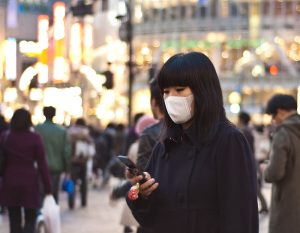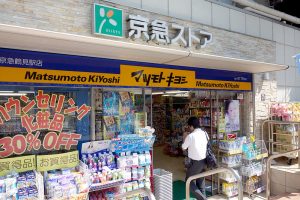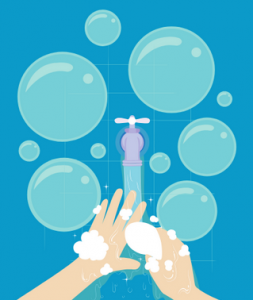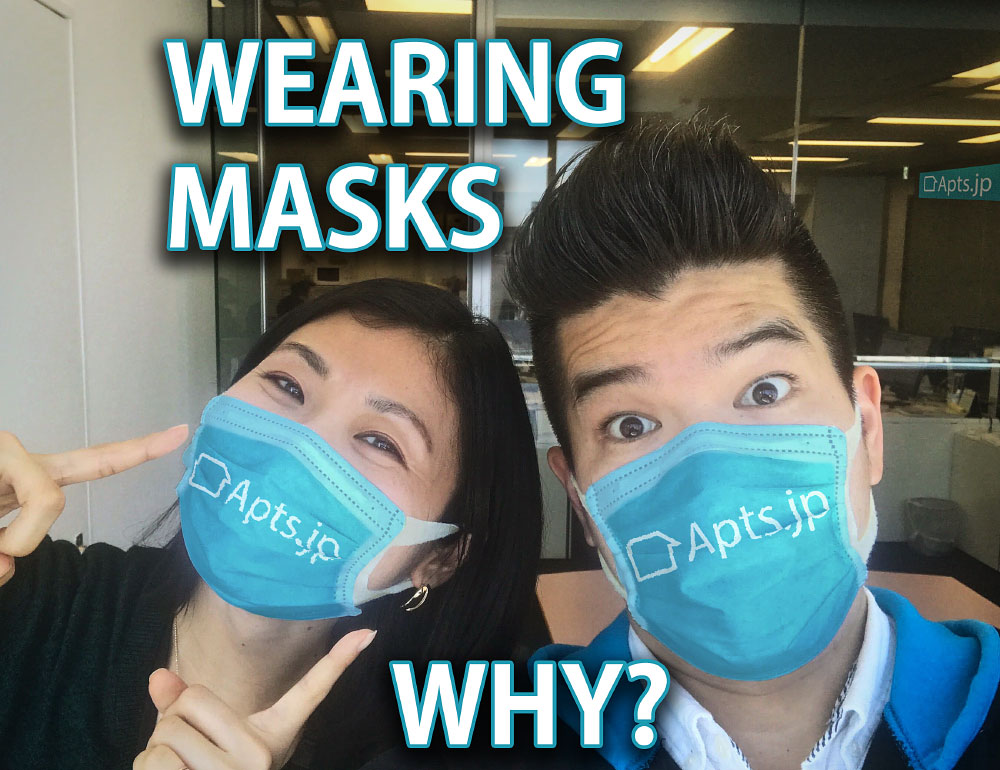Wearing masks in Japan- Should you be wearing one??
When moving to Japan- or if you’ve just started living in Japan- you might experience a few culture shocks, with one of those being the number of people wearing surgical masks! You might be startled or even worried at first, wondering if you missed the memo on a disease pandemic. Or maybe you have arrived just in time as the Coronavirus scare is on the rise (this is being written/posted during peak paranoia in March 2020!).
Whether it is Coronavirus or not, Japanese people are proud mask wearers, and for good reasons. It is a cultural experience that you shouldn’t hesitate to join in on!

(Call Masking by David Shackelford)
Should I Be Using A Mask?
Surgical masks worn by the public in Japan, first became a thing around the Spanish Flu in 1918. Since then, mask wearing has evolved into a mask wearing culture, primarily due to pollen allergies.
Japan also had a 300 year reforestation plan- which they succeeded in!- but unfortunately, most of the trees planted were cedar trees, leading to a significant rise in hay fever (kafunsho) or pollen allergies.
Surgical mask wearing started to become more and more popular around the 1990’s, as an excellent barrier for those who suffer from pollen allergies; both in the Spring season and in Autumn. This began the rise of mask wearing culture in Japan, as we know it today.
If a Japanese person has a cold and wants to prevent others from catching it, they wear a mask.
If it’s Influenza season and they can’t afford to get sick with the fiscal year coming to an end, they wear a mask.
If a Japanese office worker IS sick but they need to work those long hours, Japanese style- they wear a mask.
Allergic to pollen or dust particles, they wear a mask.
Didn’t have time to put makeup on or have hard to cover face blemishes, they wear a mask.
A celebrity not wanting to be bothered on their free time on the weekend, they wear a mask.
Feel like being antisocial and don’t want to interact with others, they wear a mask.
Nowadays, surgical masks can even be a fashion statement- black masks, cartoon masks, the works– a lot of different masks are available now.
Mask-wearing is VERY accepted in Japan, and it reeeally is totally OK to wear one! You will not signal to everyone that you have a highly contagious disease and that people should steer from you. In fact, if you are sneezing or have the sniffles, people would prefer you to wear a mask (it is very very very very very rude and highly disrespectful in Japan, to be sick and coughing and sneezing in a packed public place- such as a train- without wearing a mask).
Coronavirus, and Other Potential Health Threats
What is the Coronavirus? Check this out, if you don’t know:
https://www.who.int/health-topics/coronavirus
Right now- as of this article writing in March 2020- Japan is on careful alert, as the new virus has started to spread. Now is the time you will see more masks being worn than ever.
There are a few things you should know about mask-wearing. The WHO has announced that masks really only need to be worn by people in direct contact with COVID-19 patients and followed up by other precautions (https://www.who.int/emergencies/diseases/novel-coronavirus-2019/advice-for-public/when-and-how-to-use-masks).
In reality, though, Japan is a very highly condensed city with 37 million in the greater Tokyo metropolitan area. Japan’s land size is the size of California- a little smaller to be exact- with a population of 126 million, compared to California at 39.4 million. Looking at those numbers, you can maybe realize just how densely packed Japan’s population is.
Tokyo city has ~6,200 people per square km!!! (2017 stats)
Although the mask may not fully protect you from the virus, it can be a sense of barrier from the person who is only inches away from you. There is not much personal space in this country, and if anything, it will help stop you from touching your face after you’ve touched the same train handles, doorknobs, convenient store counters, money, etc.- that millions of others have just touched.
If you do choose to wear a mask, you should be confident that you won’t be standing out, or people won’t assume that you have the virus. There is an understanding of respect towards others, by wearing masks in this country. The Japanese believe in “not disturbing the peace of others”, and masks are used as a precaution and care for the people around them.
Here is a periodically updated article informing you of where the cases of Coronavirus in Japan are, and their numbers:
https://www.nippon.com/en/japan-data/h00657/coronavirus-cases-in-japan-by-prefecture.html
Stay up to date!
Two types of Masks: Surgical vs N95
https://www.cdc.gov/niosh/npptl/pdfs/UnderstandDifferenceInfographic-508.pdf

N95 is the most protective mask, as it is professionally fitted without any air creeping in. Although these are the most desirable, one must be trained to use them, to be the most effective. It’s highly suggested that the N95 masks should be used for serious exposure risks, such as for medical professionals on the front lines.
How To Properly Use A Mask
If you continually touch the mask to adjust it, you are potentially getting harmful bacteria all over your face, which diminishes the point of even wearing a mask.
Here are some practices that make wearing a mask more effective:
• Place the strings around your ears and fit snugly
• Pinch the top of the mask to fit securely around the bridge of your nose!
• When removing the mask, take it off from the strings around your ears and DO NOT TOUCH the front of the mask or the inside of the mask
• Discard immediately after usage, in a closed bin.
• Do not use the same mask twice
• Wash hands regularly and after mask disposal
Where Can I Buy Masks?

(Matsuomoto Kiyoshi by EvZo Photography)
All drug stores will sell masks, such as Matsumoto Kiyoshi.
You can also find them at the grocery stores, and Don Quijote, and even some Bic Cameras have a hygiene section. Convenience stores will carry them in individual packs for those times that you left the house without one.
SPECIAL NOTE: As of March 2020, with Coronavirus on alert, masks have been SOLD OUT countrywide. People are lining up hours before drug stores open to get the new stock provided for the day. Costco, for instance, has a limited amount they put out each day. If you are desperate, you might need to wake up early and get in those lines.
Overall: Best Precautions To Stay Healthy

https://www.who.int/images/default-source/health-topics/coronavirus/social-media-squares/blue-2.png
Just like you learned at school- and also as stated by World Health Organization (WHO)- washing your hands is the best prevention in spreading disease!
• Wash your hands with warm water and soap (~20 secs)
• Use the hand sanitizer that’s available to you as you enter most buildings
• DO NOT TOUCH your eyes, nose, and mouth
• If you are sick, please stay home and go see a doctor. Just because you have a mask on doesn’t give you a free pass to go on with your daily routines (despite many Japanese people doing this).
We can all work towards bacterial/viral disease, when we all take our part from helping it not spread to one another.
We hope that these precautions will help you to stay in your best health condition as you continue your journey in Japan! Mask-wearing culture does not need to be embarrassing- it’s a part of the culture that most expats eventually take a part in.
We hope to see you at your next apartment viewing, super healthy and in tip-top shape! 🙂
BONUS!!! In this video, Apts.jp Agent Jason shows how to wear a mask, without looking suspicious.
▶ Start your search now on Apts.jp!
▶ Click here to let us do the searching for you and get you into someplace great~
